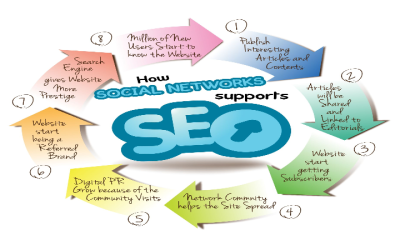When it comes to improving search engine rankings, many businesses focus heavily on on-page SEO — optimizing content, keywords, and technical structure. While these elements are crucial, they’re only part of the equation. The other half — and often the most powerful — is off-page SEO strategy.
Off-page SEO is all about building your website’s authority, credibility, and trustworthiness in the eyes of search engines. It’s how Google determines whether your site deserves to rank above competitors for valuable keywords. The stronger your off-page signals, the more likely you are to earn top positions and attract high-quality traffic.
Yet, many businesses stick to the basics — a few backlinks here and there, some social media sharing — and miss out on advanced tactics that can dramatically boost results. Let’s explore the deeper side of off-page SEO and how leveraging it strategically can elevate your online presence.
What Is Off-Page SEO and Why It Matters
At its core, off-page SEO refers to all the actions you take outside your website to improve its visibility and authority. Unlike on-page SEO, which focuses on optimizing what’s on your site, off-page signals help search engines evaluate how trustworthy and authoritative your domain is based on external references.
Search engines like Google view backlinks, brand mentions, and user signals as “votes of confidence” from other websites. The more high-quality endorsements your site receives, the more credible it appears — and the higher it’s likely to rank.
This is especially important for businesses investing in B2B SEO services, where trust and authority are critical to attracting decision-makers and securing long-term clients.
1. Quality Backlink Building: Go Beyond the Basics
Backlinks remain the backbone of any effective off-page SEO strategy. But not all links are created equal. Search engines value quality over quantity, so building authoritative, relevant, and natural backlinks is far more important than simply increasing numbers.
Here are a few advanced backlink strategies:
- Resource Page Links: Reach out to websites that maintain lists of helpful tools or services and suggest adding your content.
- Skyscraper Technique: Find high-performing content in your industry, create something better, and pitch it to sites linking to the original.
- Broken Link Building: Identify broken links on relevant websites and offer your content as a replacement.
- Niche Edits: Secure contextual links within existing high-authority articles rather than new guest posts.
Each of these methods helps you earn links that not only boost rankings but also drive qualified traffic to your site.
2. Build Authority Through Thought Leadership
Search engines increasingly reward websites that demonstrate E-E-A-T (Experience, Expertise, Authoritativeness, and Trustworthiness). One of the best ways to build this authority is by establishing your brand — and key team members — as thought leaders in your industry.
Strategies to consider:
- Guest Contributions: Publish articles on reputable industry blogs and platforms.
- Podcast Appearances: Share insights on popular podcasts in your niche.
- Industry Reports and Whitepapers: Create original research that others cite and link to.
- Speaking Engagements: Participate in webinars, virtual events, or conferences to build visibility.
These activities don’t just earn backlinks — they boost brand credibility, attract media attention, and position your company as a trusted resource in your field.
3. Leverage Digital PR and Brand Mentions
Traditional link-building focuses on outreach, but digital PR takes a broader approach. It’s about creating content and campaigns that naturally attract attention — and links — from journalists, publications, and influencers.
Some effective tactics include:
- Data-Driven Studies: Publish original research that media outlets and industry publications want to reference.
- Newsworthy Announcements: Share company milestones, partnerships, or product launches through press releases.
- Expert Commentary: Offer expert quotes to journalists through platforms like HARO (Help a Reporter Out) or Qwoted.
Even when brand mentions don’t include a direct link, they still contribute to your authority and improve your chances of ranking higher in search results.
4. Optimize for Local and Industry Citations
Citations — mentions of your business’s name, address, and phone number (NAP) on external websites — are critical for both local and B2B SEO. They help search engines verify the legitimacy of your business and boost visibility in local and industry-specific searches.
To maximize this opportunity:
- Ensure NAP consistency across all directories and platforms.
- Submit listings to niche-specific directories related to your industry.
- Update existing listings with new information, services, or keywords.
- Earn mentions in trade associations, chamber of commerce sites, and professional organizations.
High-quality citations strengthen your online footprint and help establish credibility in competitive markets.
5. Collaborate With Complementary Brands
Strategic partnerships can be a powerful — yet often overlooked — off-page SEO tactic. By collaborating with complementary businesses, you can co-create content, share backlinks, and tap into new audiences.
Examples include:
- Co-Authored Content: Create blog posts, guides, or webinars with a partner company.
- Joint Events: Host virtual events or workshops that attract backlinks from both companies’ networks.
- Cross-Promotions: Feature each other’s resources, case studies, or testimonials on your websites.
Not only does this generate valuable backlinks, but it also builds trust by associating your brand with other credible organizations.
6. Monitor and Manage Your Online Reputation
Search engines consider brand sentiment as part of their ranking signals. A positive online reputation — reflected through reviews, ratings, and mentions — enhances credibility, while negative feedback can harm visibility.
Best practices include:
- Responding promptly and professionally to reviews.
- Encouraging satisfied customers and partners to leave feedback.
- Monitoring mentions with tools like Google Alerts or Brand24.
- Addressing misinformation quickly and transparently.
Reputation management is especially crucial for B2B businesses, where trust plays a significant role in buying decisions.
Final Thoughts: Off-Page SEO Is About Authority, Not Just Links
Off-page SEO has evolved far beyond basic link building. Today, it’s about building relationships, earning trust, and establishing authority across the web. By combining advanced tactics — from digital PR and thought leadership to strategic partnerships and reputation management — businesses can strengthen their online presence and improve their search visibility.
Partnering with a result-driven digital marketing agency can help you execute these strategies effectively and scale your efforts over time. With the right off-page approach, your business won’t just climb the rankings — it will become a trusted leader in your industry.


